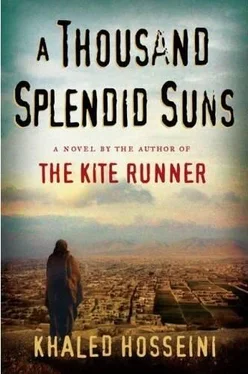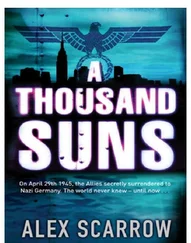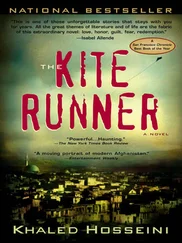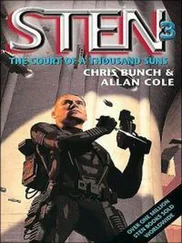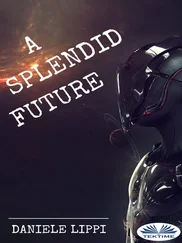Though there had been moments of beauty in it, Mariam knew that life for the most part had been unkind to her. But as she walked the final twenty paces, she could not help but wish for more of it. She wished she could see Laila again, wished to hear the clangor of her laugh, to sit with her once more for a pot of chai and leftover halwa under a starlit sky. She mourned that she would never see Aziza grow up, would not see the beautiful young woman that she would one day become, would not get to paint her hands with henna and toss noqul candy at her wedding. She would never play with Aziza's children. She would have liked that very much, to be old and play with Aziza's children.
Near the goalpost, the man behind her asked her to stop. Mariam did. Through the crisscrossing grid of the burqa, she saw his shadow arms lift his shadow Kalashnikov.
Mariam wished for so much in those final moments. Yet as she closed her eyes, it was not regret any longer but a sensation of abundant peace that washed over her. She thought of her entry into this world, the harami child of a lowly villager, an unintended thing, a pitiable, regrettable accident. A weed. And yet she was leaving the world as a woman who had loved and been loved back. She was leaving it as a friend, a companion, a guardian. A mother. A person of consequence at last. No. It was not so bad, Mariam thought, that she should die this way. Not so bad. This was a legitimate end to a life of illegitimate beginnings.
Mariam's final thoughts were a few words from the Koran, which she muttered under her breath.
He has created the heavens and the earth with the truth; He makes the night cover the day and makes the day overtake the night, and He has made the sun and the moon subservient; each one runs on to an assigned term; now surely He is the Mighty, the Great Forgiver.
"Kneel," the Talib said
O my Lord! Forgive and have mercy, for you are the best of the merciful ones.
"Kneel here, hamshira. And look down."
One last time, Mariam did as she was told.
Tariq has headaches now.
Some nights, Laila awakens and finds him on the edge of their bed, rocking, his undershirt pulled over his head. The headaches began in Nasir Bagh, he says, then worsened in prison. Sometimes they make him vomit, blind him in one eye. He says it feels like a butcher's knife burrowing in one temple, twisting slowly through his brain, then poking out the other side.
"I can taste the metal, even, when they begin."
Sometimes Laila wets a cloth and lays it on his forehead and that helps a little. The little round white pills Sayeed's doctor gave Tariq help too. But some nights, all Tariq can do is hold his head and moan, his eyes bloodshot, his nose dripping. Laila sits with him when he's in the grip of it like that, rubs the back of his neck, takes his hand in hers, the metal of his wedding band cold against her palm.
They married the day that they arrived in Murree. Sayeed looked relieved when Tariq told him they would. He would not have to broach with Tariq the delicate matter of an unmarried couple living in his hotel. Sayeed is not at all as Laila had pictured him, ruddy-faced and pea-eyed. He has a salt-and-pepper mustache whose ends he rolls to a sharp tip, and a shock of long gray hair combed back from the brow. He is a soft-spoken, mannerly man, with measured speech and graceful movements.
It was Sayeed who summoned a friend and a mullah for the nikka that day, Sayeed who pulled Tariq aside and gave him money. Tariq wouldn't take it, but Sayeed insisted. Tariq went to the Mall then and came back with two simple, thin wedding bands. They married later that night, after the children had gone to bed.
In the mirror, beneath the green veil that the mullah draped over their heads, Laila's eyes met Tariq's. There were no tears, no wedding-day smiles, no whispered oaths of long-lasting love. In silence, Laila looked at their reflection, at faces that had aged beyond their years, at the pouches and lines and sags that now marked their once-scrubbed, youthful faces. Tariq opened his mouth and began to say something, but, just as he did, someone pulled the veil, and Laila missed what it was that he was going to say.
That night, they lay in bed as husband and wife, as the children snored below them on sleeping cots. Laila remembered the ease with which they would crowd the air between them with words, she and Tariq, when they were younger, the haywire, brisk flow of their speech, always interrupting each other, tugging each other's collar to emphasize a point, the quickness to laugh, the eagerness to delight. So much had happened since those childhood days, so much that needed to be said. But that first night the enormity of it all stole the words from her. That night, it was blessing enough to be beside him. It was blessing enough to know that he was here, to feel the warmth of him next to her, to lie with him, their heads touching, his right hand laced in her left.
In the middle of the night, when Laila woke up thirsty, she found their hands still clamped together, in the white-knuckle, anxious way of children clutching balloon strings.
* * *
LAILA LIKES MURREE'S cool, foggy mornings and its dazzling twilights, the dark brilliance of the sky at night; the green of the pines and the soft brown of the squirrels darting up and down the sturdy tree trunks; the sudden downpours that send shoppers in the Mall scrambling for awning cover. She likes the souvenir shops, and the various hotels that house tourists, even as the locals bemoan the constant construction, the expansion of infrastructure that they say is eating away at Murree's natural beauty. Laila finds it odd that people should lament the building of buildings. In Kabul, they would celebrate it.
She likes that they have a bathroom, not an outhouse but an actual bathroom, with a toilet that flushes, a shower, and a sink too, with twin faucets from which she can draw, with a flick of her wrist, water, either hot or cold. She likes waking up to the sound of Alyona bleating in the morning, and the harmlessly cantankerous cook, Adiba, who works marvels in the kitchen.
Sometimes, as Laila watches Tariq sleep, as her children mutter and stir in their own sleep, a great big lump of gratitude catches in her throat, makes her eyes water.
In the mornings, Laila follows Tariq from room to room. Keys jingle from a ring clipped to his waist and a spray bottle of window cleaner dangles from the belt loops of his jeans. Laila brings a pail filled with rags, disinfectant, a toilet brush, and spray wax for the dressers. Aziza tags along, a mop in one hand, the bean-stuffed doll Mariam had made for her in the other. Zalmai trails them reluctantly, sulkily, always a few steps behind.
Laila vacuums, makes the bed, and dusts. Tariq washes the bathroom sink and tub, scrubs the toilet and mops the linoleum floor. He stocks the shelves with clean towels, miniature shampoo bottles, and bars of almond-scented soap. Aziza has laid claim to the task of spraying and wiping the windows. The doll is never far from where she works.
Laila told Aziza about Tariq a few days after the nikka.
It is strange, Laila thinks, almost unsettling, the thing between Aziza and Tariq. Already, Aziza is finishing his sentences and he hers. She hands him things before he asks for them. Private smiles shoot between them across the dinner table as if they are not strangers at all but companions reunited after a lengthy separation.
Aziza looked down thoughtfully at her hands when Laila told her.
"I like him," she said, after a long pause.
"He loves you."
"He said that?"
"He doesn't have to, Aziza."
Читать дальше
